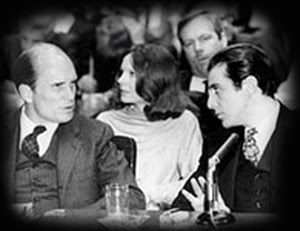
From The New York Times today:
President Vladimir V. Putin of Russia directed a vast cyberattack aimed at denying Hillary Clinton the presidency and installing Donald J. Trump in the Oval Office, the nation’s top intelligence agencies said in an extraordinary report they delivered on Friday to Mr. Trump.
The officials presented their unanimous conclusions to Mr. Trump in a two-hour briefing at Trump Tower in New York that brought the leaders of America’s intelligence agencies face to face with their most vocal skeptic, the president-elect, who has repeatedly cast doubt on Russia’s role. The meeting came just two weeks before Mr. Trump’s inauguration and was underway even as the electoral votes from his victory were being formally counted in a joint session of Congress.
Soon after leaving the meeting, intelligence officials released the declassified, damning report that described the sophisticated cybercampaign as part of a continuing Russian effort to weaken the United States government and its democratic institutions. The report — a virtually unheard-of, real-time revelation by the American intelligence agencies that undermined the legitimacy of the president who is about to direct them — made the case that Mr. Trump was the favored candidate of Mr. Putin.
The Times story is a mostly fair, if incomplete, description of the report itself, which is a provocative, disturbing and infuriating document. Damning? I don’t know about that. Anyone can damn something, but to be sure the damning is just requires evidence.
Observations and Questions:
1. The report isn’t evidence of anything. It just isn’t, and anyone or any source that states otherwise is misleading us. It would not be admissible as evidence if Russia or Putin were on trial in the U.S. for trying to influence the 2016 election. The document is a statement of opinions after analysis of material and sources we are not allowed to see. At the beginning, the report goes to great lengths to explain why this is, and the explanation is sound. Unless, however, the position we are supposed to take is that the intelligence community is to be assumed to be 100% correct, uninfluenced by bias, and ought to be believed without reservations despite the presence of hard evidence, the declassified report is a statement by experts of an analysis based on experience and study, of exactly what, we don’t know.
2.Regarding the Times story: the intention of the news media to undermine the Trump Presidency and bolster Democrats who want to blame their candidate’s defeat on anything but her own weaknesses and conduct appears to be on display in the Times story. For example, we have this statement:
“The Russian leader, the report said, sought to denigrate Mrs. Clinton, and the report detailed what the officials had revealed to President Obama a day earlier: Mr. Trump’s victory followed a complicated, multipart cyberinformation attack whose goal had evolved to help the Republican win.”
The leaping to the logical fallacy of post hoc ergo propter hoc (“after this, therefor because of it”) is both a human tendency to be avoided and well-known. This statement appeals to it, intentionally, or incompetently. The fact that Trump’s shocking victory came after the cyber-attacks does not mean or even suggest that the attacks were responsible for that result. The Times immediately, in the next sentence, even states that “The 25-page report did not conclude that Russian involvement tipped the election to Mr. Trump.” Well, those are mixed messages. Do I, based on the uninterrupted anti-Trump attitude of the Times in its headlines, placement of stories, tone and pitch of news reports, op-eds and editorials, conclude that the mixed message is intentional or sparked by negligence seeded by bias?
I do.
3. Much further down in its story, the Times admits, Continue reading →









